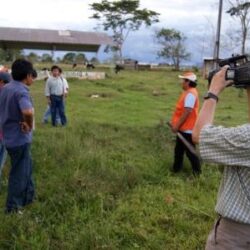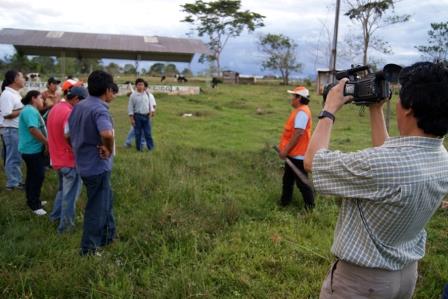
A Regional Forum on Territorial Development, Innovation and Rural Communication took place in Brazil from 12-13 November. More than 100 participants from 15 Latin American countries came together to share experiences of rural communication and innovation and discuss the need for institutional frameworks.
The Forum was organized by the Food and Agriculture Organization of the United Nations (FAO), the Brazilian Ministry of Agrarian Development (MDA) and the Brazilian Agricultural Research Cooperation (EMBRAPA). The event took place as part of FAO’s Regional Initiative on Family Farming and Rural Territorial Development, aimed at reducing rural poverty and increasing food security in Latin American and the Caribbean.
The Forum served to share experiences of territorial development while valuing communication for development as key to the participation of family farmers in decision-making. It was an opportunity to identify priorities, institutional options and partnerships for socially inclusive rural communication services that could strengthen family farming programs and policies.
More about the Forum objectives, expected results, structure and methodology
MAIN RESULTS AND CONCLUSIONS
Day 1 of the Forum focused on territorial development, family farming and innovation. Following discussions on these issues, it was concluded that there is a need to construct efficient communication processes to enhance territorial development and innovation policies. Furthermore, the exchange of experiences between countries will generate the development of policies for family farming and increase collaboration between the public sector and farmer organizations.
Day 2 of the Forum discussed rural communication and dialogo de saberes (inclusive dialogue between peasant and technical knowledge). The main recommendations were:
- To recognize the central role of communication as a factor in social change, participation and improving quality of life among rural populations, guaranteeing the creation of rural communication services in the context of policies for family farming and territorial development
- To strengthen the communication for development capacities of stakeholders in family farming
- To promote the construction of rural communication services and policies with the active participation of communication networks, community media and civil society organizations
- To generate research on the role of rural extension and advisory services and produce evidence to guide rural communication service for family farming
A number of steps were suggested in order to achieve these goals:
- Map communication for development initiatives, services and actors at regional level
- Promote rural communication services in the agendas of the Community of Latin American and Caribbean States (CELAC), the Specialized Meeting on Family Farming of MERCOSUR (REAF), governments and social organizations
- Improve the exchange of good practices and South-South collaboration in rural extension and advisory services and rural communication at regional level
- Strengthen cooperation in matters of rural extension and advisory services and rural communication between institutions, governments, producer organizations, community media and communication networks in the region
- Put the issues of communication services for family farming in the context of the next FAO Regional Conference and the Regional Initiative on Family Farming and Territorial Development, as well as the upcoming CELAC and REAF events
- Promote the Onda Rural initiative as a space for exchange and active collaboration in communication for rural development at the regional level
The Forum culminated in a Final Declaration (in Spanish) that outlines the need to guarantee social inclusion in all actions and policies for territorial rural development, and to construct processes of efficient communication for the development, dissemination and participation in these policies.
Along with FAO, EMBRAPA and MDA several organizations committed to play an active role in moving forward this regional agenda, including REAF but also the International Centre for Advanced Studies in Communications forLatin America (CIESPAL), the World Association of Community Radio Broadcasters (AMARC), the Latin American Coordination of Peasant Organizations (CLOC) and Argentina’s National Institute of Agricultural Technology (INTA).

